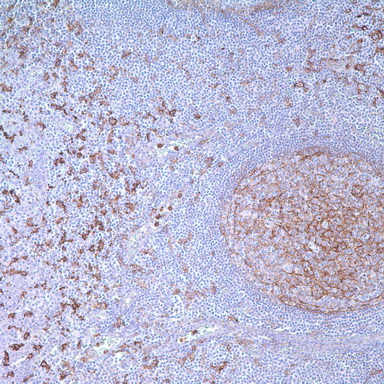CD14 Rabbit Monoclonal Antibody [Clone ID: EPR3653]
Other products for "CD14"
Specifications
| Product Data | |
| Clone Name | EPR3653 |
| Applications | IHC |
| Recommended Dilution | IHC: 1:50 - 1:200 |
| Reactivities | Human |
| Host | Rabbit |
| Isotype | IgG |
| Clonality | Monoclonal |
| Formulation | This antibody is supplied as cell culture supernatant diluted in tris buffered saline, pH 7.3-7.7, with 1% BSA and <0.1% sodium azide. |
| Conjugation | Unconjugated |
| Storage | Store at -20°C as received. |
| Stability | Stable for 12 months from date of receipt. |
| Gene Name | CD14 molecule |
| Database Link | |
| Synonyms | CD14 antigen; CD14 molecule; monocyte differentiation antigen CD14 |
| Note | Anti-CD14 labels a 55 kDa, glycosyl-phosphatidylinositol-linked membrane protein, involved in endotoxin binding and recognition of apoptotic cells. CD14 is expressed by monocytes and dermal dendritic cells; anti-CD14 is considered to be a macrophage-derived monocyte marker. CD14 is also present in granulocytes, endothelial, epithelial cells, and placental trophoblasts. In the spleen, CD14 can be expressed in the red pulp and marginal zone cells, and histiocytes around sheathed capillaries. In the lymph node, true sinusoidal histiocytes, and follicular dendritic cells stain with anti-CD14. However, other monocyte-derived cells in the lymph node, such as in sinusoidal histiocytosis with erythrophagocytosis, macrophages associated with anthracosis, germinal center tingible body macrophages in reactive germinal centers, and diffuse large B-cell lymphoma do not express CD14 antigen. CD14 is not expressed in plasmacytoid dendritic cells. Anti-CD14 positive histiocytes are reported as markedly increased in DLBCL, but not in CLL/SLL, MCL, or FL.Anti-CD14 is useful in confirming a diagnosis of massive lymphadenopathy with sinus histiocytosis (Rosai-Dorfman disease) when used in a panel including anti-S100 and anti-CD68. Anti-CD14 can also be used for decalcified bone marrow biopsy specimens to show increased myelomonocytic and monocytic neoplastic cells in chronic myelomonocytic leukemia and monocytic leukemia, and is very helpful in the distinction of myeloproliferative neoplasms, myelodysplastic syndrome, and acute monocytic leukemia. This antibody is more sensitive for leukemic monocytic cells than antibodies directed against CD163 and CD68/PG-M1. |
| Reference Data | |
| Protein Families | Adult stem cells, Druggable Genome, Embryonic stem cells, ES Cell Differentiation/IPS, Transmembrane |
| Protein Pathways | Hematopoietic cell lineage, MAPK signaling pathway, Pathogenic Escherichia coli infection, Regulation of actin cytoskeleton, Toll-like receptor signaling pathway |
Documents
| Product Manuals |
| FAQs |
{0} Product Review(s)
0 Product Review(s)
Submit review
Be the first one to submit a review
Product Citations
*Delivery time may vary from web posted schedule. Occasional delays may occur due to unforeseen
complexities in the preparation of your product. International customers may expect an additional 1-2 weeks
in shipping.






























































































































































































































































 Germany
Germany
 Japan
Japan
 United Kingdom
United Kingdom
 China
China



